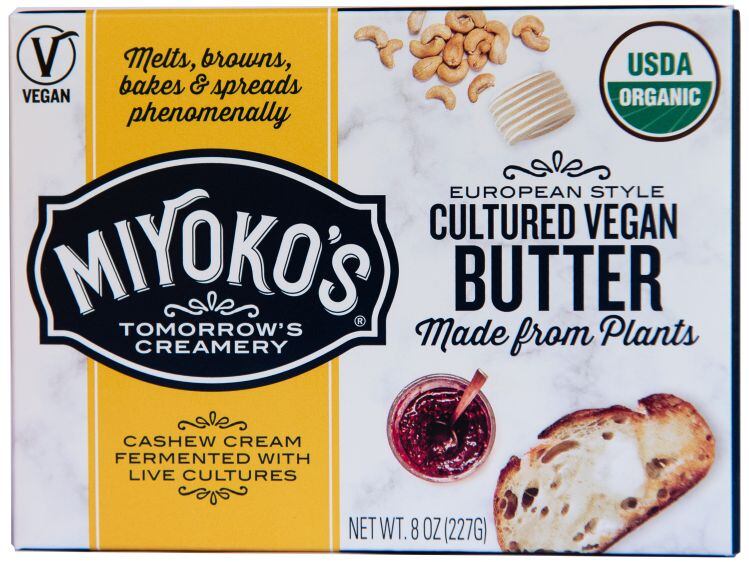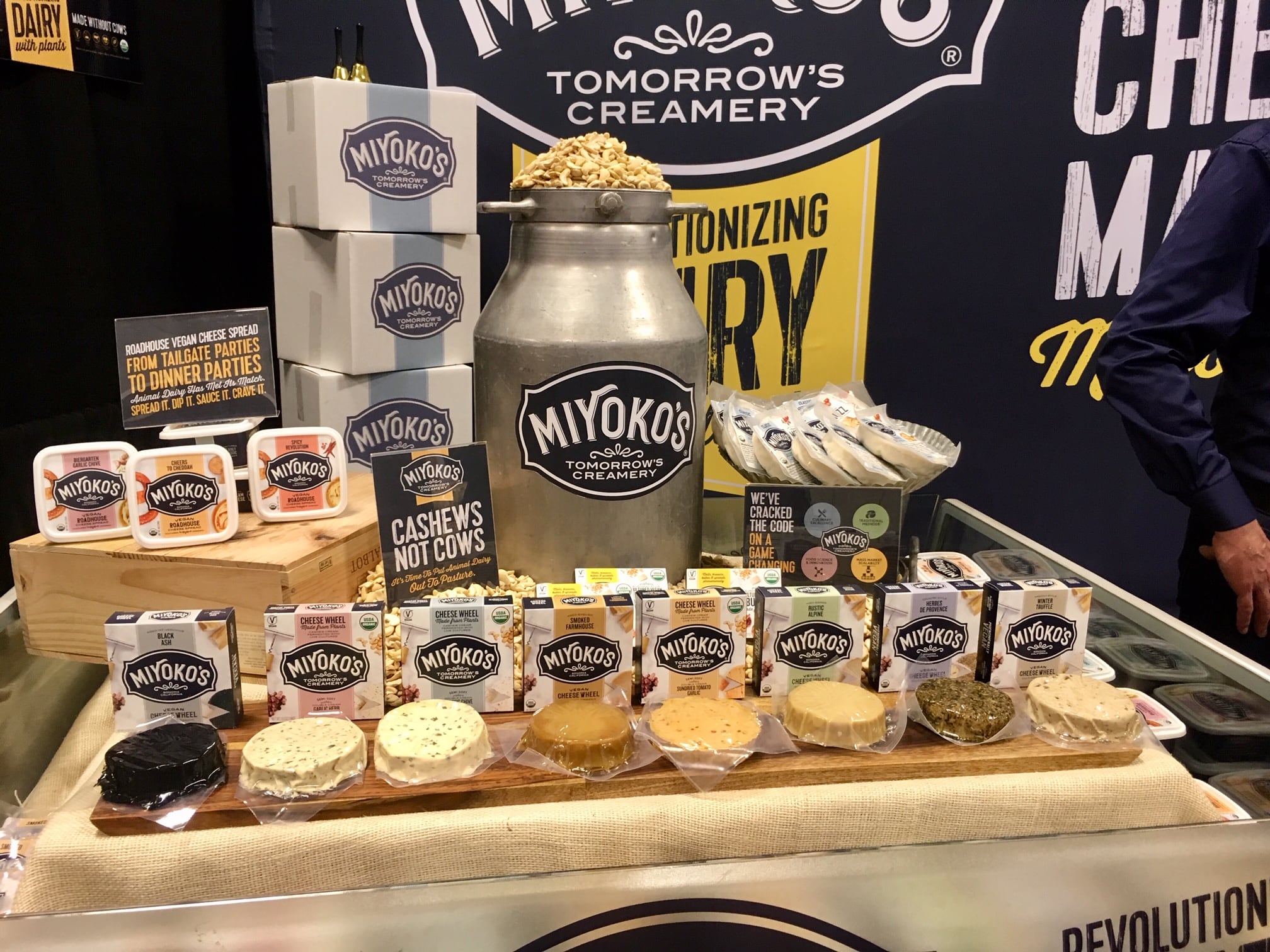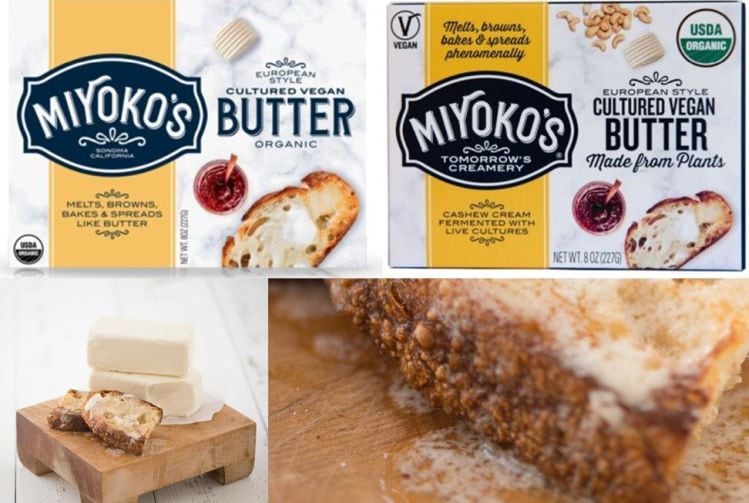In a proposed class action lawsuit* filed last October in New York, plaintiff Jasmine Brown alleged that Miyoko’s Kitchen vegan butter - which is made from coconut oil, sunflower oil and cultured cashew nuts – “basks in dairy’s ‘halo’” but lacks its nutrients (vitamin A, D and calcium), and does not meet the FDA standard of identity for butter, which mandates at least 80% milk fat.
When the case was filed, company founder Miyoko Schinner told FoodNavigator-USA that she had anticipated her decision to use the term ‘butter’ might attract the attention of the plaintiff's bar, but added: “At some point you have to [decide whether you are going to] hide behind the curtain or go out on stage and say who you really are and what you are really trying to do, and we made that decision.
“This is something that could potentially impact the entire industry so we are being proactive.”
We're not making any label changes
Asked this week whether she had come to a private settlement with the plaintiffs, she said: “We have been asked to not comment on it besides saying it was dismissed to the satisfaction of both parties. It was truly a good outcome: that's about all I can say."
But she added: "This was a very unusual, extremely surprising settlement that did not benefit the lawyer or plaintiff in particular. It was a settlement that would put a smile to your face. Unfortunately, I can't discuss it. Unfortunately as well, because we didn't get a dismissal in court, it doesn't protect us against other copycat lawsuits."
Asked whether she would be changing her labels as a result of the settlement, she said: “No, we're not making any changes.”
Private settlements: The pros and cons
While he was not involved in the case, Perkins Coie partner David Biderman noted that a voluntary dismissal “usually, absent something exceptional, means a private confidential settlement.”
He added: “Private settlements are not always for low amounts but some attorneys make a practice of suing, negotiating for a quick settlement and going away.”
While it’s a quicker and cheaper option for the defendant than a lengthy legal battle, he said, “A private settlement does not bind the class of purchasers so another suit can be brought over the same issue.”
The regulations about dairy and dairy substitutes are so specific that the 'butter' and 'creamery' words made Miyoko’s Kitchen very vulnerable
An attorney who has represented lots of food companies against food labeling lawsuits, who asked not to be named, added: "I am surprised that this suit settled and would not be at all surprised if there were copycats.
"The company seemed to be very earnest in wanting to supply plant-based dairy substitutes, but the regulations about dairy and dairy substitutes are so specific that the 'butter' and 'creamery' words made Miyoko’s Kitchen very vulnerable."
What does it mean when you see in court filings that a case has been 'voluntarily dismissed'?
"A voluntary dismissal can either be due to a fundamental flaw in the plaintiff’s case that makes it imprudent to proceed, or it can be due to a mutually agreed upon settlement at an amount far below what the plaintiff initially claims that he/she is entitled to," says Bill Acevedo, attorney at Wendel Rosen Black & Dean.
"Fundamental flaws, though, aren’t limited to a non-viable legal theory. They can also include things such as problems with a plaintiff’s standing to bring the claim, proof that the defendant already changed the labels at issue before the lawsuit was brought, or smaller sales than the plaintiff assumed (which, by extension, lowers the amount of damages that a plaintiff might recover).
"Any of these flaws will typically result in a dismissal or a nominal injunctive and/or monetary settlement to make the matter go away without further burden or expense to the parties."
Private settlements can save time and money
Bill Acevedo, attorney at Wendel Rosen Black & Dean, said he understood why defendants often settled cases, even if they they were confident they would win at a trial, but said the desire to settle early and quickly to avoid the cost and hassle of protracted litigation has had unintended consequences.
"An argument could be made that labeling lawsuits have proliferated, in part, due to the desire of businesses to quickly and cheaply resolve them without much in the way of contesting the matters on their merits. As a result, a plaintiff may think that he/she has nothing to lose by making a claim, especially if it results in some payout for very little (legal) effort.
"Maybe I am biased [Acevedo is a defense attorney], but not every labeling violation claim asserted is a good one," he argued.
"Still, the cost in defending against labeling violation claims through a protracted litigated process is typically more than the average business can afford to bear, which is why defendants settle, and plaintiffs are more than happy to exploit this weakness, meritorious claims or not."
*The case is Jasmine Brown et al v Miyoko’s Kitchen Inc, filed October 30 in the eastern district of New York. 2:18-cv-06079

“We’ve decided to define the future. We’re not going to tiptoe around, we’re not going to hide in the closet, and call it, you know, ‘cultured nut product’ or all these things that we did initially.
“We are the future of dairy, dairy products will come from plants, and we’re going to drive that momentum, we’re going to drive that movement and call it the way it should be called… we’re not going to be afraid, and call it the way consumers refer to these products anyway.”
Miyoko Schinner, speaking to FoodNavigator-USA at the Winter Fancy Food Show in January 2019 (WATCH the video)



